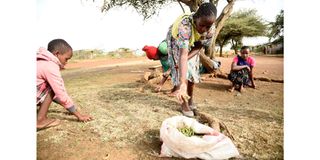Premium
Declare drought a national disaster, governors demand

Mrs Mary Lemeroni and her family collect pods from an acacia tree to feed livestock as drought bites in Sorandoru village, Samburu West.
What you need to know:
- County bosses call for livelihood support, including the distribution of relief food to the most vulnerable.
- The famine has been made worse by the recent desert locust invasion that wiped out vegetation cover across the northern and north eastern Kenya.
There is increasing alarm in the counties amid reports that the ongoing drought could worsen.
Governors have now urged President Uhuru Kenyatta to declare the famine affecting arid and semi-arid lands (Asal) a national disaster.
In a meeting with the UN Resident Coordinator Stephen Jackson, the county bosses described the situation as overwhelming.
The meeting was held to discuss mitigation for the ongoing drought in the northern parts of the country. The governors, under the banner of the Frontier Counties Development Council (FCDC), in a joint statement called for livelihood support, including the distribution of relief food to the most vulnerable. They also want cash transfer programmes set up immediately.
“We are urging the national government to start emergency livestock off-take to cushion pastoralists against heavy losses,” said Garissa Governor Ali Korane.
FCDC member counties include Garissa, Isiolo, Lamu, Mandera, Marsabit, Tana River and Wajir.
The famine has been made worse by the recent desert locust invasion that wiped out vegetation cover across the northern and north eastern Kenya.
In need of urgent assistance
“We are now faced with a drought that has already shown extreme severity in areas like Kutulo and Mandera West sub-counties as well as parts of Wajir County,” said Mandera Governor and FCDC chairperson Ali Roba.
This comes amid a forecast by the Intergovernmental Authority on Development Climate Prediction and Applications Centre (ICPAC) of worsening conditions in Kenya, Tanzania, Burundi, Rwanda, Somalia, Ethiopia and Eritrea. The regional body says food insecurity is likely to worsen, requiring greater humanitarian interventions.
The centre further says 2021 is expected to be drier than usual for majority of the regions.
“Observations of rainfall over the past months reveal that the region has been facing rainfall deficits in many parts of central and southern East Africa and this is forecasted to continue until December 2021,” the ICPAC report dated August 27 says in part.
According to the report, Eastern region and other Asal counties are set to be hit hard. Poor rains and late-onset coupled with other non-climatic drivers like Covid-19, economic shocks and conflicts present poor prospects for farming across the region.
The agency further said more than 30 million people in Eastern Africa will likely be highly food insecure and in need of urgent assistance.
The Frontier Counties Development Council has urged member counties to reprioritise their budgets to deal with the drought.
It has also declared the drought a county-level emergency in North Eastern and demanded a Ward Development Fund set up by end of December 2021.
Mitigating drought impact
“It has been tough over the past 12 months. The three rainy seasons in the region were suppressed leading to pasture and water scarcity,” Mr Roba noted while calling for concerted efforts by the State and development partners.
Some counties have begun buying weak animals from pastoralists in an off-take programme. The animals will be slaughtered and the meat distributed among poor households.
Samburu Governor Moses Lenolkulal said that they are aiming to buy between 5,000 to 10,000 animals in the first phase of the programme.
“The current drought is pushing out pastoralists to invade private ranches while others are fighting for available scarce resources. Instead of waiting for the animals to die due to the ongoing drought, the off-take programme will help mitigate the impacts of droughts for now," the governor said.
According to the governor, off-take programmes have proved successful in the past in mitigating drought impact.
The Samburu county chief said the destocking exercise will help offload animals before they become emaciated and lose their value, or die, enabling pastoralists to salvage some capital from their livestock and supporting families with cash to meet their food needs.
"We want them to salvage some capital and relieve pressure on scarce water and pasture resources and protect their livelihoods. By doing this, we will have strengthened the communities' ability to recover from the short and long effects of the drought," Mr Lenolkulal added.






